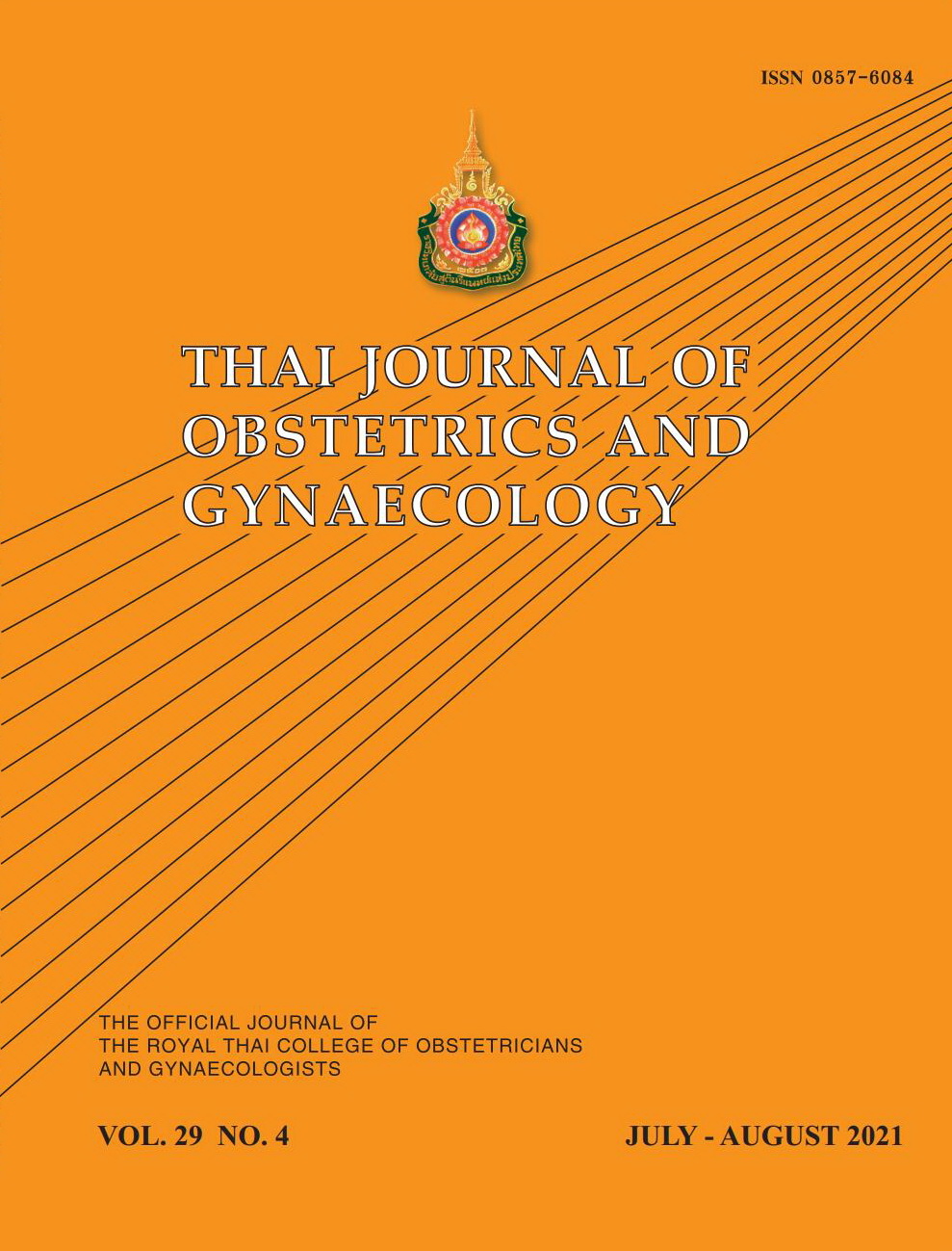Knowledge of Pregnant Women on Gestational Weight Gain and Associated Factors
Main Article Content
Abstract
Objectives: To evaluate knowledge of pregnant women on pre-pregnancy body mass index (BMI) status, gestational weight gain (GWG) and associated factors.
Materials and Methods: A total of 230 singleton, healthy pregnant women who attended antenatal clinic before 20 weeks of gestation were included. Knowledge and self-evaluation of BMI status and GWG were evaluated by self-administered questionnaire. Various characteristics were compared between those with correct and incorrect self-evaluation of BMI and GWG to identify possible associated factors.
Results: Mean age was 29.2 years and 67.8% were nulliparous. Mean BMI was 22.3 kg/m2, 17% were overweight and 5.2% were obese. Of 230 women, 20.9% and 62.2% did not know their BMI status and appropriate GWG, respectively. BMI status were correctly identified in 55.7% while 3.9% and 19.6% under- and overestimated their status. Appropriate GWG were correctly identified in only 12.2% while 15.7% and 10% under- and overestimated their GWG. Underweight women were significantly more likely to overestimate their BMI status and GWG while overweight/obese women were more likely to overestimate their GWG. Women who graduated Bachelor degree or higher were significantly more likely to correctly identify their BMI status (p = 0.007) and GWG (p = 0.019). Women with normal weight were significantly more likely to correctly identify their BMI status (p < 0.001), but not GWG.
Conclusions: Only 55.7% and 12.2% of pregnant women can correctly identify their BMI status and appropriate GWG. Pre-pregnancy BMI status and higher education significantly associated with correct knowledge on both issues.
Article Details
References
Obesity: Preventing and managing the global epidemic. Report of a WHO consultation. World Health Organ Tech Rep Ser 2000;894:1-253.
Butte NF, Ellis KJ, Wong WW, Hopkinson JM, Smith EO. Composition of gestational weight gain impacts maternal fat retention and infant birth weight. Am J Obstet Gynecol 2003;189:1423-32.
Cedergren M. Effects of gestational weight gain and body mass index on obstetric outcome in Sweden. Int J Gynaecol Obstet 2006;93:269-74.
Fraser A, Tilling K, Macdonald-Wallis C, Sattar N, Brion MJ, Benfield L, et al. Association of maternal weight gain in pregnancy with offspring obesity and metabolic and vascular traits in childhood. Circulation 2010;121:2557-64.
Raatikainen K, Heiskanen N, Heinonen S. Transition from overweight to obesity worsens pregnancy outcome in a BMI-dependent manner. Obesity (Silver Spring) 2006;14:165-71.
Stothard KJ, Tennant PW, Bell R, Rankin J. Maternal overweight and obesity and the risk of congenital anomalies: a systematic review and meta-analysis. JAMA 2009;301:636-50.
Callaway LK, O’Callaghan M, McIntyre HD. Obesity and the hypertensive disorders of pregnancy. Hypertens Pregnancy 2009;28:473-93.
Rasmussen KM, Yaktine AL, editors. Weight gain during pregnancy: Reexamining the guidelines. Washington, DC: The National Academies Press; 2009.
Deputy NP, Sharma AJ, Kim SY. Gestational weight gain - United States, 2012 and 2013. MMWR Morb Mortal Wkly Rep 2015;64:1215-20.
Herring SJ, Nelson DB, Davey A, Klotz AA, Dibble LV, Oken E, et al. Determinants of excessive gestational weight gain in urban, low-income women. Womens Health Issues 2012;22:e439-46.
Herring SJ, Oken E, Haines J, Rich-Edwards JW, Rifas-Shiman SL, Kleinman Sc DK, et al. Misperceived pre-pregnancy body weight status predicts excessive gestational weight gain: findings from a US cohort study. BMC Pregnancy Childbirth 2008;8:54.
Shub A, Huning EY, Campbell KJ, McCarthy EA. Pregnant women’s knowledge of weight, weight gain, complications of obesity and weight management strategies in pregnancy. BMC Res Notes 2013;6:278.
Shulman R, Kottke M. Impact of maternal knowledge of recommended weight gain in pregnancy on gestational weight gain. Am J Obstet Gynecol 2016;214:754 e1-7.
Ng M, Fleming T, Robinson M, Thomson B, Graetz N, Margono C, et al. Global, regional, and national prevalence of overweight and obesity in children and adults during 1980-2013: a systematic analysis for the Global Burden of Disease Study 2013. Lancet 2014;384:766-81.
Emery RL, Benno MT, Salk RH, Kolko RP, Levine MD. Healthcare provider advice on gestational weight gain: uncovering a need for more effective weight counselling. J Obstet Gynaecol 2018;38:916-21.
Lopez-Cepero A, Leung K, Moore Simas T, Rosal MC. Association between obstetric provider’s advice and gestational weight gain. Matern Child Health J 2018;22:1127-34.
Weeks A, Liu RH, Ferraro ZM, Deonandan R, Adamo KB. Inconsistent weight communication among prenatal healthcare providers and patients: A narrative review. Obstet Gynecol Surv 2018;73:423-32.


